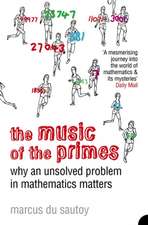Homo Deus: A Brief History of Tomorrow: Sapiens
Autor Yuval Noah Hararien Limba Engleză Paperback – 23 mar 2017
| Toate formatele și edițiile | Preț | Express |
|---|---|---|
| Paperback (2) | 74.75 lei 23-34 zile | +37.07 lei 6-10 zile |
| Random House – 23 mar 2017 | 74.75 lei 23-34 zile | +37.07 lei 6-10 zile |
| Harper Collins Publ. USA – 4 sep 2018 | 145.42 lei 17-23 zile | +12.60 lei 6-10 zile |
| Hardback (1) | 201.35 lei 17-23 zile | +17.45 lei 6-10 zile |
| Harper Collins Publ. USA – 21 feb 2017 | 201.35 lei 17-23 zile | +17.45 lei 6-10 zile |
Preț: 74.75 lei
Preț vechi: 91.46 lei
-18%
13.22€ • 15.68$ • 11.44£
Carte disponibilă
Livrare economică 27 februarie-10 martie
Livrare express 10-14 februarie pentru 47.06 lei
Specificații
ISBN-10: 1784703931
Pagini: 512
Dimensiuni: 129 x 197 x 46 mm
Greutate: 0.46 kg
Editura: Random House
Colecția Vintage
Seriile Sapiens, Gates Notes - Cărți recomandate de Bill Gates, Brandminds, Biblioteca Antreprenoria, cărți recomandate de Dan Ștefan, Autonom, Cărțile Sidoniei Bogdan, Homo Deus
Descriere
Sapiens showed us where we came from. Homo Deus shows us where we're going. This book explores the projects, dreams and nightmares that will shape the twenty-first century - from overcoming death to creating artificial life. It asks questions: Where do we go from here? And how will we protect this fragile world from our own destructive powers?
Notă biografică
Prof Yuval Noah Harari has a PhD in History from the University of Oxford and now lectures at the Hebrew University of Jerusalem, specialising in World History. Sapiens: A Brief History of Humankind has become an international phenomenon attracting a legion of fans from Bill Gates and Barack Obama to Chris Evans and Jarvis Cocker, and is published in 65 languages worldwide. It was a Sunday Times Number One bestseller and was in the Top Ten for over nine months in paperback. His follow-up to Sapiens, Homo Deus: A Brief History of Tomorrow was also a Top Ten Bestseller and was described by the Guardian as 'even more readable, even more important, than his excellent Sapiens'. 21 Lessons for the 21st Century, was a Number One Bestseller and was described by Bill Gates as 'fascinating' and 'crucial'. Harari worked closely with renowned comics illustrator Daniel Casanave and co-writer David Vandermeulen to create his latest book, an adaptation of his first bestseller, Sapiens Graphic Novel: Volume 1.
Textul de pe ultima copertă
Yuval Noah Harari, author of the critically acclaimed New York Times bestseller and international phenomenon Sapiens, returns with an equally original, compelling, and provocative book, turning his focus toward humanity’s future and our quest to upgrade humans into gods.
Over the past century, humankind has managed to do the impossible: turn the uncontrollable forces of nature—namely famine, plague, and war—into manageable challenges. Today more people die from eating too much than from eating too little; more people die from old age than from infectious diseases; and more people commit suicide than are killed by soldiers, terrorists, and criminals combined. We are the only species in earth’s long history that has single-handedly changed the entire planet, and we no longer expect any higher being to mold our destinies for us.
What then will replace famine, plague, and war at the top of the human agenda? What destinies will we set for ourselves, and which quests will we undertake? Homo Deus explores the projects, dreams, and nightmares that will shape the twenty-first century, from overcoming death to creating artificial life. But the pursuit of these very goals may ultimately render most human beings superfluous. So where do we go from here? And how can we protect this fragile world from our own destructive powers? We cannot stop the march of history, but we can influence its direction.
Future-casting typically assumes that tomorrow, at its heart, will look much like today: we will possess amazing new technologies, but old humanist values like liberty and equality will guide us. Homo Deus dismantles these assumptions and opens our eyes to a vast range of alternative possibilities, with provocative arguments on every page, among them:
- The main products of the twenty-first-century economy will not be textiles, vehicles, and weapons but bodies, brains, and minds.
- While the Industrial Revolution created the working class, the next big revolution will create the useless class.
- The way humans have treated animals is a good indicator for how upgraded humans will treat us.
- Democracy and the free market will both collapse once Google and Facebook know us better than we know ourselves, and authority will shift from individual humans to networked algorithms.
- Humans won’t fight machines; they will merge with them. We are heading toward marriage rather than war.
This is the shape of the new world, and the gap between those who get on board and those left behind will be larger than the gap between industrial empires and agrarian tribes, larger even than the gap between Sapiens and Neanderthals. This is the next stage of evolution. This is Homo Deus.
Recenzii
“Thrilling to watch such a talented author trample so freely across so many disciplines... Harari’s skill lies in the way he tilts the prism in all these fields and looks at the world in different ways, providing fresh angles on what we thought we knew... scintillating.” — Financial Times
“Spellbinding… This is a very intelligent book, full of sharp insights and mordant wit... It is a quirky and cool book, with a sliver of ice at its heart... It is hard to imagine anyone could read this book without getting an occasional, vertiginous thrill.” — Guardian
“Harari is an intellectual magpie who has plucked theories and data from many disciplines - including philosophy, theology, computer science and biology - to produce a brilliantly original, thought-provoking and important study of where mankind is heading.” — Evening Standard (London)
“I enjoyed reading about these topics not from another futurist but from a historian, contextualizing our current ways of thinking amid humanity’s long march–especially…with Harari’s ability to capsulize big ideas memorably and mingle them with a light, dry humor…Harari offers not just history lessons but a meta-history lesson.” — Washington Post
“What elevates Harari above many chroniclers of our age is his exceptional clarity and focus.” — London Sunday Times
“A remarkable book, full of insights and thoughtful reinterpretations of what we thought we knew about ourselves and our history.” — The Guardian
“Provocative...the handiwork of a gifted thinker.” — Jennifer Senior, New York Times
“[A] great book…not only alters the way you see the world after you’ve read it, it also casts the past in a different light. In Homo Deus, Yuval Noah Harari shows us where mankind is headed in an absolutely clear-sighted & accessible manner.” — Mail on Sunday
“Like all great epics, Sapiens demanded a sequel. Homo Deus, in which that likely apocalyptic future is imagined in spooling detail, is that book. It is a highly seductive scenario planner for the numerous ways in which we might overreach ourselves.” — The Observer (London)
“Thank God someone finally wrote [this] exact book.” — Sebastian Junger, New York Times Book Review
“Harari is an exceptional writer, who seems to have been specially chosen by the muses as a conduit for the zeitgeist… Fascinating reading.” — Times Literary Supplement (London)
“Sapiens takes readers on a sweeping tour of the history of our species…. Harari’s formidable intellect sheds light on the biggest breakthroughs in the human story…important reading for serious-minded, self-reflective sapiens.” — Washington Post
“Sapiens tackles the biggest questions of history and of the modern world, and it is written in unforgettably vivid language.” — Jared Diamond, Pulitzer Prize-winning author of Guns, Germs, and Steel, Collapse, and The World until Yesterday
“In Sapiens, Harari delves deep into our history as a species to help us understand who we are and what made us this way. An engrossing read.” — Dan Ariely, New York Times Bestselling author of Predictably Irrational, The Upside of Irrationality, and The Honest Truth About Dishonesty
“Provocative… essential reading.” — New York Times Book Review
“Thought-provoking and enlightening, Harari’s books is a must-read for anyone interested in the future of our species.” — BookPage
“…[S]hares DNA with the work of writers like Jared Diamond … while drawing freely from other disciplines in both the humanities and sciences. It’s emphatically a work for the general reader eager to grapple with big ideas, but who is equally hungry for context for today’s headlines.” — Shelf Awareness

































